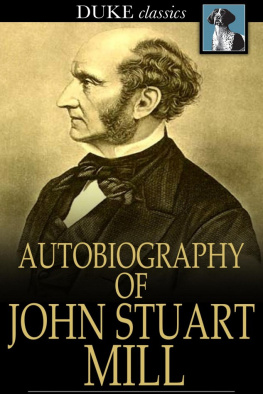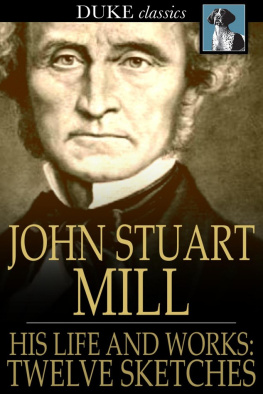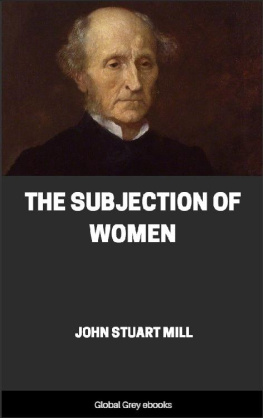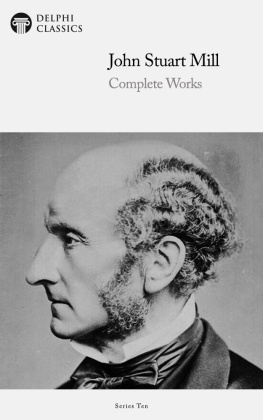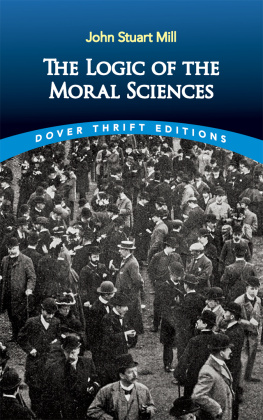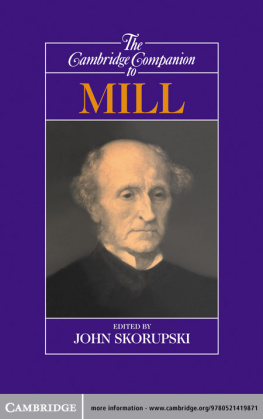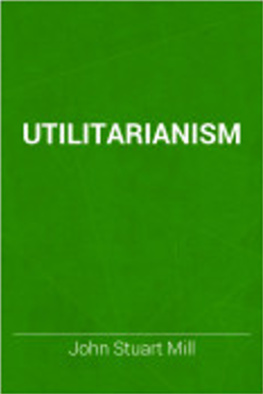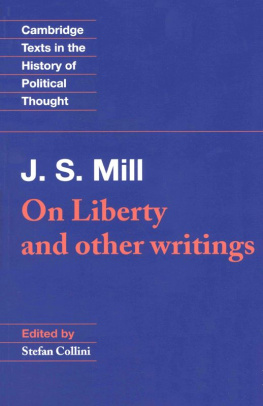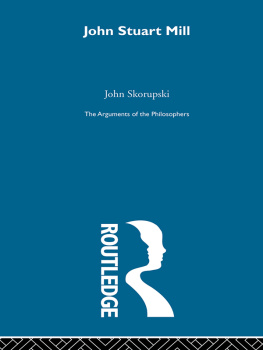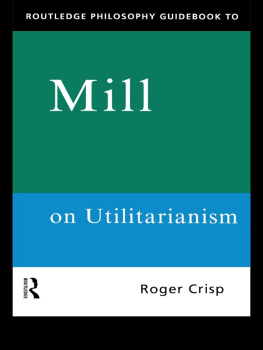Grote - Review of the Work of John Stuart Mill
Here you can read online Grote - Review of the Work of John Stuart Mill full text of the book (entire story) in english for free. Download pdf and epub, get meaning, cover and reviews about this ebook. genre: Science. Description of the work, (preface) as well as reviews are available. Best literature library LitArk.com created for fans of good reading and offers a wide selection of genres:
Romance novel
Science fiction
Adventure
Detective
Science
History
Home and family
Prose
Art
Politics
Computer
Non-fiction
Religion
Business
Children
Humor
Choose a favorite category and find really read worthwhile books. Enjoy immersion in the world of imagination, feel the emotions of the characters or learn something new for yourself, make an fascinating discovery.
Review of the Work of John Stuart Mill: summary, description and annotation
We offer to read an annotation, description, summary or preface (depends on what the author of the book "Review of the Work of John Stuart Mill" wrote himself). If you haven't found the necessary information about the book — write in the comments, we will try to find it.
Grote: author's other books
Who wrote Review of the Work of John Stuart Mill? Find out the surname, the name of the author of the book and a list of all author's works by series.
Review of the Work of John Stuart Mill — read online for free the complete book (whole text) full work
Below is the text of the book, divided by pages. System saving the place of the last page read, allows you to conveniently read the book "Review of the Work of John Stuart Mill" online for free, without having to search again every time where you left off. Put a bookmark, and you can go to the page where you finished reading at any time.
Font size:
Interval:
Bookmark:
The Project Gutenberg EBook of Review of the Work of Mr John Stuart Mill
Entitled, 'Examination of Sir William Hamilton's Philosophy.', by George Grote
This eBook is for the use of anyone anywhere at no cost and with
almost no restrictions whatsoever. You may copy it, give it away or
re-use it under the terms of the Project Gutenberg License included
with this eBook or online at www.gutenberg.net
Title: Review of the Work of Mr John Stuart Mill Entitled, 'Examination of Sir William Hamilton's Philosophy.'
Author: George Grote
Release Date: April 12, 2004 [EBook #12002]
Language: English
*** START OF THIS PROJECT GUTENBERG EBOOK REVIEW OF MR JOHN STUART MILL ***
Produced by The Online Distributed Proofreading Team.
An Examination of Sir William Hamilton's Philosophy, and of the Principal Philosophical Questions discussed in his Writings. By JOHN STUART MILL. London: Longmans. 1865.
The work bearing the above title is an octavo volume, consisting of twenty-eight chapters, and five hundred and sixty pages. This is no great amount of print; but the amount of matter contained in it is prodigious, and the quality of that matter such as to require a full stretch of attention. Mr Mill gives his readers no superfluous sentences, scarcely even a superfluous word, above what is necessary to express his meaning briefly and clearly. Of such a book no complete abstract can be given in the space to which we are confined.
To students of philosophydoubtless but a minority among the general circle of English readersthis work comes recommended by the strongest claims both of interest and instruction. It presents in direct antithesis two most conspicuous representatives of the modern speculative mind of EnglandSir W. Hamilton and Mr John Stuart Mill.
Sir W. Hamilton has exercised powerful influence over the stream of thought during the present generation. The lectures on Logic and Metaphysics delivered by him at Edinburgh, for twenty years, determined the view taken of those subjects by a large number of aspiring young students, and determined that view for many of them permanently and irrevocably.[1] Several eminent teachers and writers of the present day are proud of considering themselves his disciples, enunciate his doctrines in greater or less proportion, and seldom contradict him without letting it be seen that they depart unwillingly from such a leader. Various new phrases and psychological illustrations have obtained footing in treatises of philosophy, chiefly from his authority. We do not number ourselves among his followers; but we think his influence on philosophy was in many ways beneficial. He kept up the idea of philosophy as a subject to be studied from its own points of view: a dignity which in earlier times it enjoyed, perhaps, to mischievous excess, but from which in recent times it has far too much recededespecially in England. He performed the great service of labouring strenuously to piece together the past traditions of philosophy, to re-discover those which had been allowed to drop into oblivion, and to make out the genealogy of opinions as far as negligent predecessors had still left the possibility of doing so.
The forty-six lectures on Metaphysics, and the thirty-five lectures on Logic, published by Messrs Mansel and Veitch, constitute the biennial course actually delivered by Sir W. Hamilton in the Professorial Chair. They ought therefore to be looked at chiefly with reference to the minds of youthful hearers, as preservatives against that mischief forcibly described by Rousseau'L'inhabitude de penser dans la jeunesse en te la capacit pendant le reste de la vie.'
Now, in a subject so abstract, obscure, and generally unpalatable, as Logic and Metaphysics, the difficulty which the teacher finds in inspiring interest is extreme. That Sir W. Hamilton overcame such difficulty with remarkable success, is the affirmation of his two editors; and our impression, as readers of his lectures, disposes us to credit them. That Sir W. Hamilton should have done this effectively is in itself sufficient to stamp him as a meritorious professoras a worthy successor to the chair of Dugald Stewart, whose unrivalled perfection in that department is attested by every one. Many a man who ultimately adopted speculative opinions opposed to Dugald Stewart, received his first impulse and guidance in the path of speculation from the lasting impression made by Stewart's lectures.
But though we look at these lectures, as they ought to be looked at, chiefly with a view to the special purpose for which they were destined, we are far from insinuating that they have no other merits, or that they are useless for readers who have already a metaphysical creed of their own. We have found them both instructive and interesting: they go over a large proportion of the field of speculative philosophy, partly from the point of view (not always the same) belonging to the author, partly from that of numerous predecessors whom he cites. We recognize also in Sir W. Hamilton an amount of intellectual independence which seldom accompanies such vast erudition. He recites many different opinions, but he judges them all for himself; and, what is of still greater moment, he constantly gives the reasons for his judgments. To us these reasons are always of more or less value, whether we admit them to be valid or not. Many philosophers present their own doctrine as if it were so much ascertained and acknowledged truth, either intimating, or leading you to suppose, that though erroneous beliefs to the contrary formerly prevailed, these have now become discredited with every one. We do not censure this way of proceeding, but we prefer the manner of Sir W. Hamilton. He always keeps before us divergence and discrepancy of view as the normal condition of reasoned truth or philosophy; the characteristic postulate of which is, that every affirmative and every negative shall have its appropriate reasons clearly and fully enunciated.
In this point of view the appendix annexed to the lectures is also valuable; and the four copious appendixes or dissertations following the edition of Reid's works, are more valuable still. How far Sir W. Hamilton has there furnished good proof of his own doctrines on External Perception, and on the Primary Qualities of Matter, we shall not now determine; but to those who dissent from him, as well as to those who agree with him, his reasonings on these subjects are highly instructive: while the full citations from so many other writers contribute materially not only to elucidate the points directly approached, but also to enlarge our knowledge of philosophy generally. We set particular value upon this preservation of the traditions of philosophy, and upon this maintenance of a known perpetual succession among the speculative minds of humanity, with proper comparisons and contrasts. We have found among the names quoted by Sir W. Hamilton, and, thanks to his care, several authors hardly at all known to us, and opinions cited from them not less instructive than curious. He deserves the more gratitude, because he departs herein from received usage since Bacon and Descartes. The example set by these great men was admirable, so far as it went to throw off the authority of predecessors; but pernicious so far as it banished those predecessors out of knowledge, like mere magazines of immaturity and error. Throughout the eighteenth century, all study of the earlier modes of philosophizing was, for the most part, neglected. Of such neglect, remarkable instances are pointed out by Sir W. Hamilton.
Font size:
Interval:
Bookmark:
Similar books «Review of the Work of John Stuart Mill»
Look at similar books to Review of the Work of John Stuart Mill. We have selected literature similar in name and meaning in the hope of providing readers with more options to find new, interesting, not yet read works.
Discussion, reviews of the book Review of the Work of John Stuart Mill and just readers' own opinions. Leave your comments, write what you think about the work, its meaning or the main characters. Specify what exactly you liked and what you didn't like, and why you think so.


